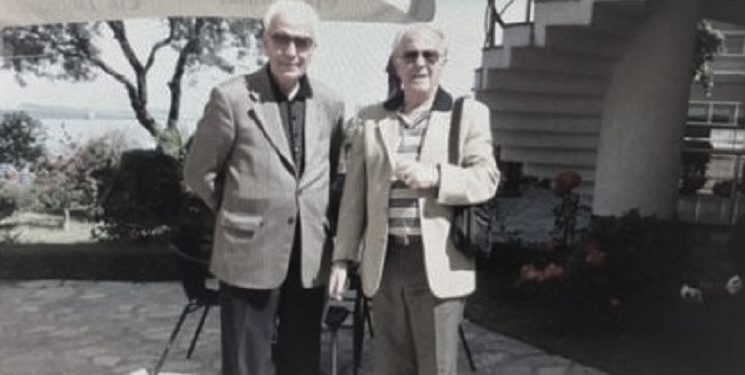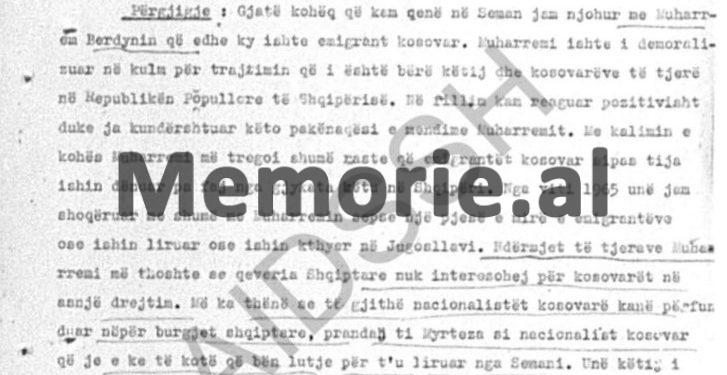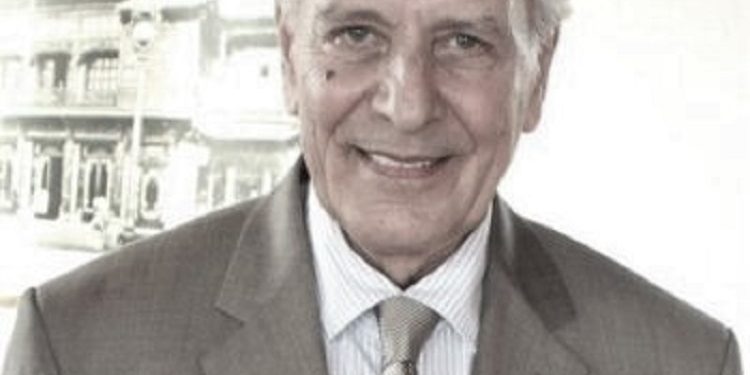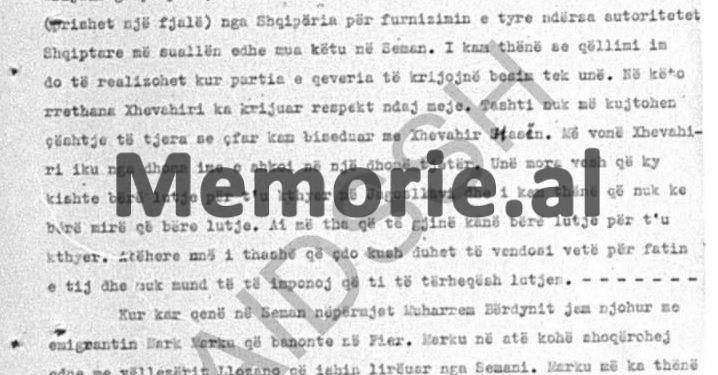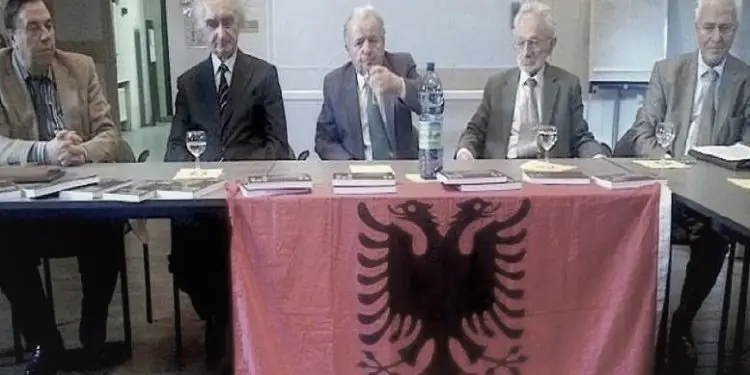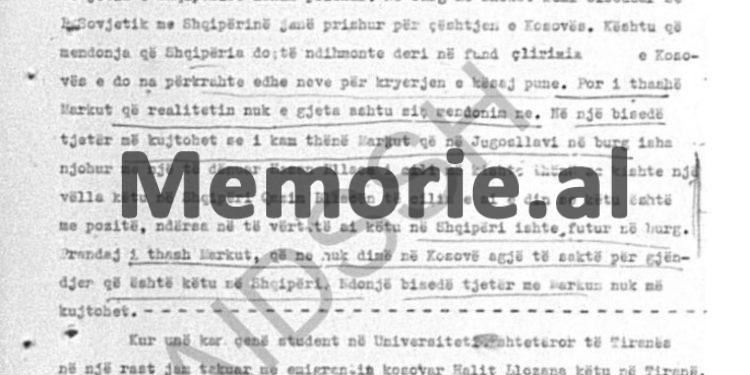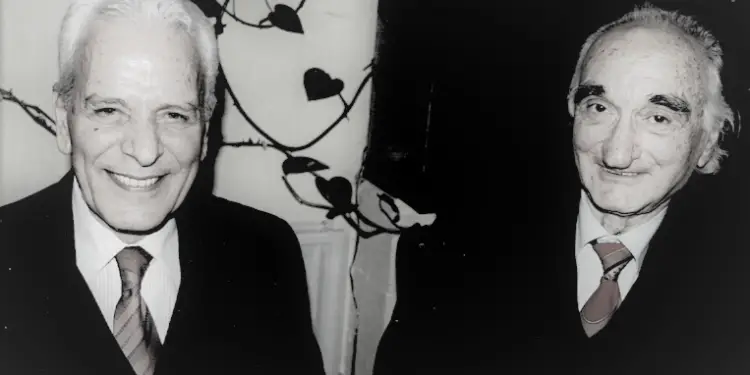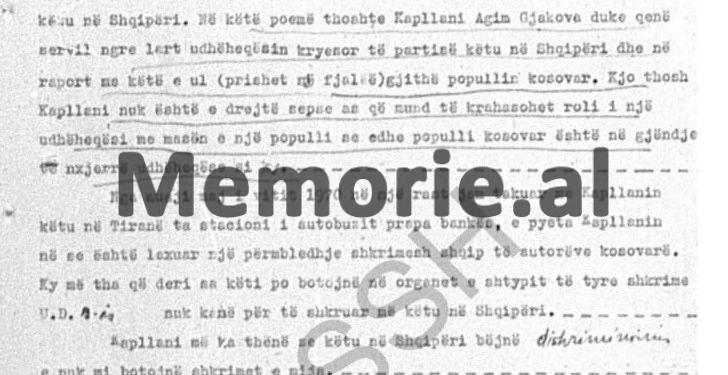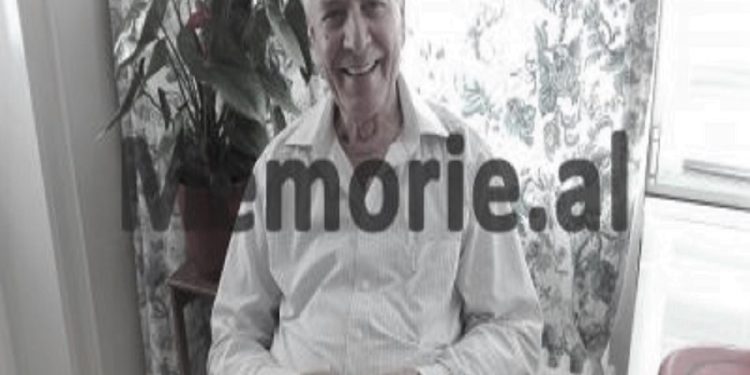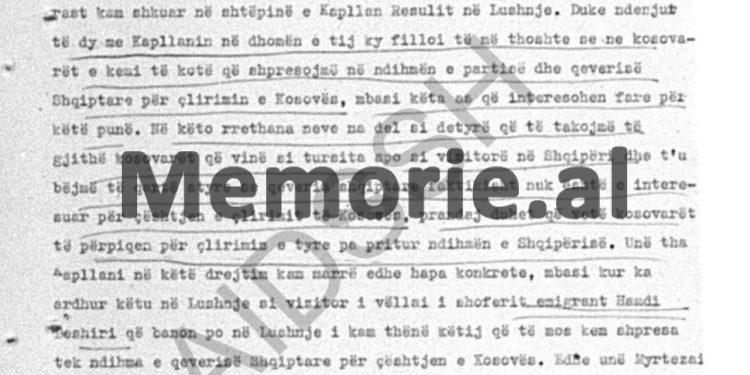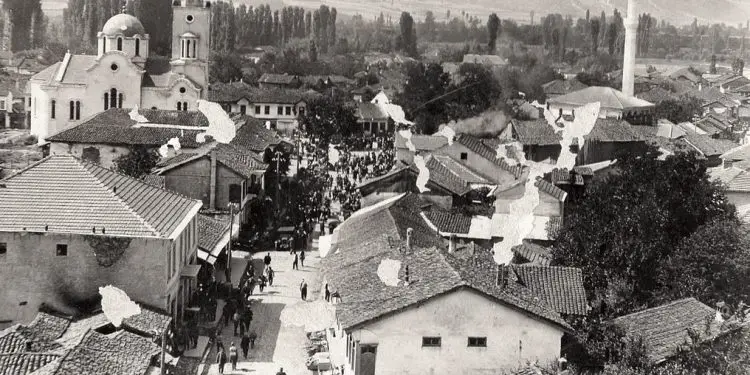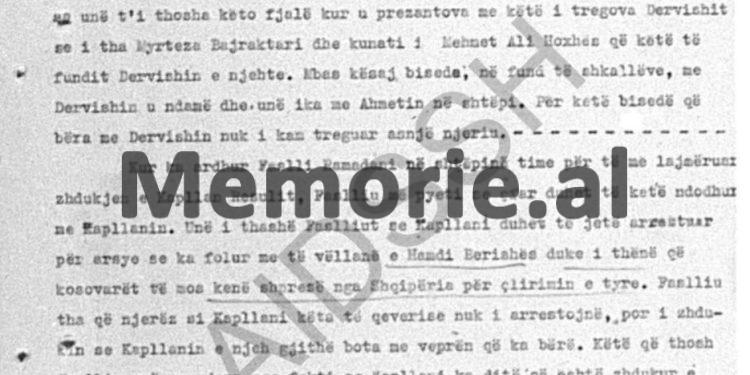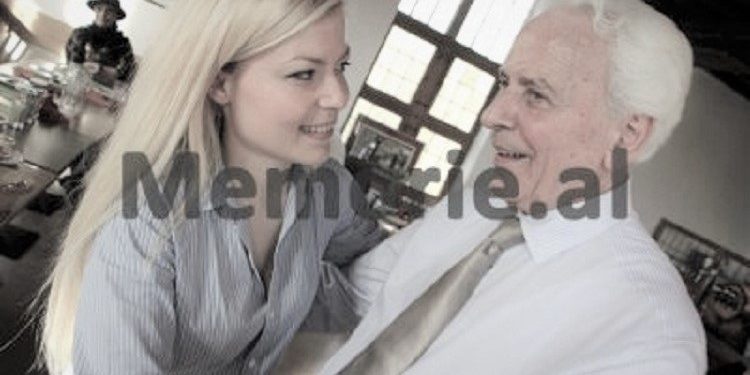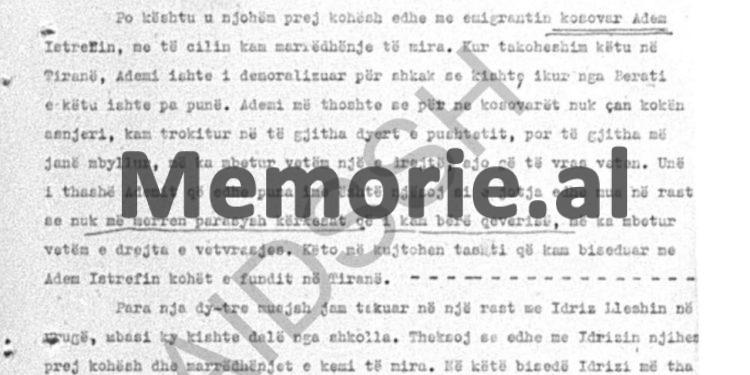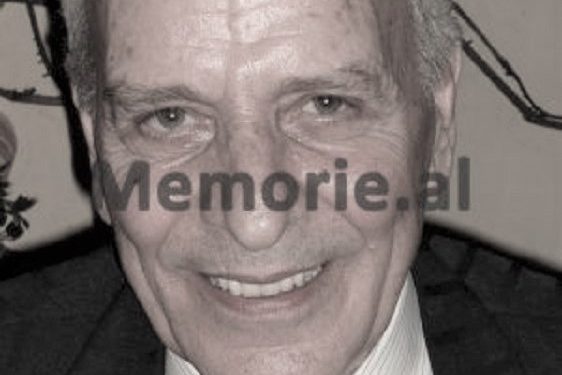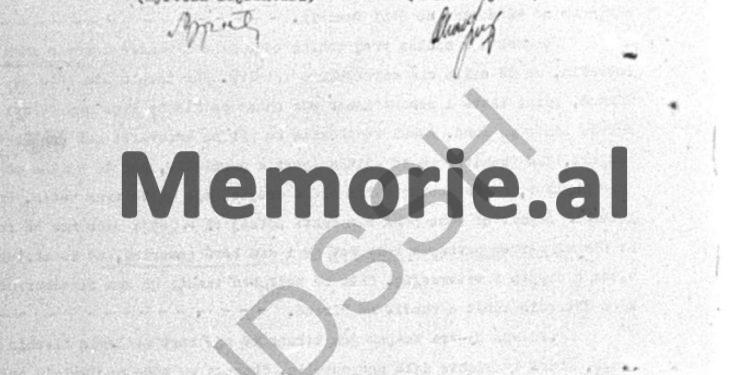Dashnor Kaloçi
Part fourteen
Memorie.al/ publishes some archival documents issued by the institution of the Authority for Information of Former State Security Files, where is the voluminous file (forms, investigative and judicial), of Myrteza Bajraktari originating from Gostivar, who after finishing school high school in the city of Tetovo, in 1952, began his higher studies at the University of Skopje, in the branch of Philosophy, where in addition to teaching he was employed as a journalist in the newspaper “Flaka e Vllaznimit” published in Skopje, from where he was fired soon after, he published an article where he was openly against the displacement of Yugoslav Albanians to Turkey and as a result, he was appointed as a teacher in the 7-year school “Shaban Zeneli” in Kumanovo. Myrtezai was arrested by the UDB in 1952, after he was part of a secret organization called the ‘Albanian National-Democratic Organization’, and he was sentenced to seven years in political prison, which he served in the Nis prison and Idrizovo. Escape from Yugoslavia and coming to Albania, where after staying for some time in the internment camp in Seman of Fier, he was given the right to high school, graduating from the University of Tirana in Language and Literature, but after refusing the appointment in the city of Berat, in 1971, he was arrested and sentenced to seven years in political prison, on charges of “agitation and propaganda”. Release from prison and leaving without work until the collapse of the communist regime and his appointment as Consul General of Albania in Switzerland, until 1993, and then his election as Honorary President of the Albanian League in the World, for the countries of Benelux, where he worked for the cause of Kosovo, until he passed away on December 11, 2020. The entire complete file of Myrteza Bajraktari, with the names of officials and officers of the State Security, the nicknames of collaborators, “colleagues” and The “compatriots” who followed and monitored him, the provocateurs in the investigation cells, the witnesses who appeared in court, the letters sent to Enver Hoxha and the high official instances where he demanded his innocence, etc., etc., are published for the first time by Memorie .al
Continued from the previous issue
The document with the minutes of the interrogation of Myrteza Bajraktari, by the investigator of the Ministry of Internal Affairs, Elham Gjika, dated December 9, 1970
PROCESS – VERBAL
Tirana on 9.12.1970
I, Elham Gjika, an investigator at the Ministry of Internal Affairs, interrogate Myrteza Bajraktari.
Question: Defendant gives us explanations about the charge.
Answer: During the time I was in Seman, I met Muharrem Bërdyni, who was also a Kosovar emigrant. Muharrem was demoralized at the height of his treatment of him and other Kosovars in the People’s Republic of Albania. At first I reacted positively, opposing these dissatisfactions and thoughts to Muharrem.
Over time, Muharremi told me many cases where Kosovar immigrants had been convicted innocently, according to him, by the courts here in Albania. Since 1965, I have been more associated with Muharram because a good part of the emigrants were either released or returned to Yugoslavia.
Among other things, he told me that the Albanian government was not interested in Kosovars in any way. He told me that all Kosovar nationalists have ended up in Albanian prisons, so you, Myrteza, as a Kosovar nationalist, are in vain praying to be released from Semani.
I told him that I was in prison in Yugoslavia as a Kosovar nationalist, and I told him about my efforts and those of my friends to denounce the displacement of Albanians from Yugoslavia to Turkey. How I made these conversations, I do not remember. Muharrem, as far as I remember, told me that here in Albania, there is a crematorium for the disappearance of people.
He also told me that the Albanian government does not even intend to be interested in the liberation of Kosovo. These are the conversations I remember having with Muharram at the time. In Seman, I also met another Kosovar immigrant, Xhevair Hasin.
I have tried to arouse in him patriotic feelings, showing the efforts and struggle of Kosovars in the prisons of Yugoslavia for the national cause. Xhevairi told me his whole biography, how he had escaped from Gostivar to Albania and how he had tried to meet his father here, and to cooperate with him, but he could not. I told him how I had worked on the issue of Kosovo.
In broad terms, I also told him about my arrival in Albania, telling him that in Yugoslavia I had formed groups for the liberation of Kosovo. I came to get weapons from Albania for their supply, while the Albanian authorities brought me here in Seman. I told him that my goal will be realized when the party and the government build trust in me.
In these circumstances, Xhevairi has created respect for me. I found out that he had prayed to return to Yugoslavia, and I told him that you did not do well for this prayer. He told me that everyone had prayed to return.
Then I said to him: everyone should be aware of their own destiny. When I was in Seman, through Muharrem Bërdyn, I met the other emigrant Mark Marku, who lived in Fier.
He was at that time accompanied by the Llazana brothers, who had been released from Semani. Mark told me that: I have respect for you that you were in the prisons of Yugoslavia for the national cause. Marku also told me that when he was in Tirana, he had raised the issue of Kosovars’ education and had been unmasked as a nationalist.
Marku told me that the Albanian authorities send Montenegrin emigrants to school and not Kosovar ones. He also told me that in Albania, I was fought as a nationalist and some cadres of the Ministry of Interior. I, said Mark, in Yugoslavia I was part of an illegal organization and fought for the cause of the nation.
Marku told me that: I had come to Albania late, because I should have known that the Albanian government is not interested in the Kosovo issue at all. He told me that I had better stay in Yugoslavia to continue my studies there. I told Mark that at the time I came from Yugoslavia to Albania, it was a complicated situation, as Albania had just broken off relations with the Soviet Union.
In prison we talked with friends, that Tirana and Moscow, severed relations on the issue of Kosovo. So I thought that Albania would help us for the liberation of Kosovo. But I told Mark that we did not find the reality as we claimed. I remember telling Mark that in prison I met Hasan Bllaca, who a brother in Albania had named Kasem Bllaca, who was in prison.
So we in Kosovo did not know anything exactly about the situation here in Albania. Another thing I do not remember talking to Mark. When I was a student at the University of Tirana, I met another Kosovar named Halit Llazana and he told me that he had prayed to leave. I told him you did well, as he was not stabilizing here.
Haliti told me that when he went to Yugoslavia, he would live with his first wife. I met Kapllan Resuli from the end of 1965, when I came from Fier to Lushnje. Before we only had correspondence.
Kapllani had quarreled with some other Kosovars over the work of the book “Drini i Bardhë”, written by Agim Gjakova. Kapllani at that time said that Agim Gjakova, is a very low man.
Agimi wrote this book only to have the support of the government and the party. Agimi is servile and has done so in Albania. In this poem Kapllani emphasizes, Agimi as a servile that he is, raises the communist leader of Albania and lowers the Kosovar people.
This Kapllani said, is not right, because the weight of a leader cannot be compared with that of an entire people, and the Kosovar people are able to produce leaders like this.
In May 1970, on one occasion, I met with Kapllani in Tirana and asked him if he had read a collection of Albanian writings by Kosovar authors. He told me that until UDB articles are published here in their press, then they will not have to write here in Albania.
Kapllani told me that in Albania, they discriminate and do not publish my writings. These things I remember for now. I read the minutes, the statements were written correctly and I signed it.
Defendant Investigator
Myrteza Bajraktari Elham Gjika
The document with the minutes of the interrogation of Myrteza Bajraktari, by the investigator of the Ministry of Internal Affairs, Elham Gjika, dated 10 December 1970
Verbal process
In Tirana, on 10/12/1970
I, Elham Gjika, an investigator at the Ministry of Internal Affairs, interrogate Myrteza Bajraktari.
Question: Defendant continues to give explanations about the charge.
Answer: For two or three months, before I was arrested, on one occasion I went to Kapllan Resuli’s house in Lushnje, sitting with Kapllani in his room, and he started telling me that: we Kosovars have it is in vain that we hope for the help of the Party and the Albanian government for the liberation of Kosovo, since they are not even interested in this work at all.
In these circumstances, it is our duty to meet all Kosovars who come as tourists or as visitors to Albania and to make it clear to them that the Albanian government is not actually interested in the issue of the liberation of Kosovo, therefore we must for the Kosovars themselves to strive for their liberation, without waiting for the help of Albania.
I – said Kapllani – in this direction I have taken concrete steps, after when he came here in Lushnje as a visitor, the brother of the emigrant driver, Hamdi Beshiri, who lives in Lushnje, I told him that: to have no hope to the assistance of the Albanian government for the issue of Kosovo.
I, Myrtezai, after these talks of Kapllani, agreed with his opinion and promised him that he would talk to any Kosovar emigrant who would come to Albania, and that I had the opportunity to meet.
Shortly after, from this conversation I had with Kapllan Resuli, I had the opportunity and met with the Kosovar visitor, Dervish Orxhain, with this I met in the wardrobe of the Great Palace of Culture, after I came out of a show I had seen in Opera House.
I saw this show together with my cousin, Ahmet Sadiku, when we went down to the wardrobe to get overcoats, Ahmeti met Dervishi, as they had known each other for a long time, and they were schoolmates.
Dervishi had other friends from the delegation of the University of Prishtina, but he separated from them and met with Ahmeti. He also met Ahmet Dervishi with me. After wearing the overcoat, I accompanied the Dervish up the stairs of the Palace.
During the escort, I told Dervishi not to have many illusions in the kindness of the Albanian government, the Albanian government, I told Dervishi, does not love the Kosovars of Kosovo. Dervishi, after seeing me once, said to me: thank you for the explanation you gave me, we will take it into account in our work, for the liberation of Kosovo.
Before I said these words, when I was introduced to this, I told Dervishi that he had told him Myrteza Bajraktari, and Mehmet Ali Hoxha’s brother-in-law, whom the latter, Dervishi knew. After this conversation at the bottom of the stairs, Dervish and I parted and I left with Ahmeti at home. For this conversation I had with Dervish, I did not tell any man.
When Faslli Ramadani came to my house to announce the disappearance of Kapllan Resuli, Faslliu asked me what must have happened to Kapllani. I told Faslli that Kapllani must have been arrested because he talked to Hamdi Berisha’s brother, telling him that Kosovars should not have hope from Albania for their liberation.
Faslliu said that people like Kapllani, those in the government, are not arrested, but disappeared, because Kapllani is known all over the world for the crime he has committed. What Faslliu said, I derive from the fact that Kapllani, has known that he has disappeared and does not know anything about him, nor his family or anyone else. We talked to Faslli not to talk to other people about what we knew about Kapllani’s arrest. After that, Faslli and I parted in this case.
I also had a hostile conversation with the Kosovar emigrant, Gani Demiri (Ratkoceri) who lives in Tirana. I have known Gani for a long time and for all the time, we have had a good relationship with each other.
As far as I remember, the hostile conversations I had with this specifically are: A couple of months ago, I met Gani Demir at his house. Being alone in both, we started the conversation about the relations that have started between Kosovo and Albania. Ganiu, was enthusiastic about these established relationships.
I told Gani that: you have many illusions and beliefs in these relationships, while I myself do not believe in the goodness of these relationships. I told Gani that the liberation of Kosovo can be done if a world war occurs, where Germany will help us, because Germany is an anti-Slavic state.
Ganiu said: you Myrteza, you are with the old woman, who as the elders said, that Germany will unite us. For a long time, I do not remember talking to Gani Demir in this case. We have also known for a long time the Kosovar emigrant, Adem Istrefi, with whom I have good relations.
When we met here in Tirana, Ademi was demoralized, because he had left Berat, and here he was out of work. Ademi told me that: for us Kosovars, no one plows their head, I knocked on all the doors of power, but all were closed to me, I have only one right left that is to kill myself.
I told Adem that my job is the same as yours, and I, if they did not take into account the requests I made to the government, I have only the right to commit suicide. I remember these now that I talked to Adem Istrefi, recently in Tirana.
Two or three months ago, I met on one occasion with Idriz Lleshi on the street. I emphasize that I have known Idrizi for a long time and we have a good relationship. In this conversation, Idrizi told me that: for us Kosovar emigrants, no one here’s in Albania.
I said: leave these, but look at the biggest thing that, if the relations between Albania and Kosovo are always improving, we, the Kosovar emigrants, will be wiped off the face of the earth by the Albanian government, because this falls in relations with those who are in power in Kosovo today and with the fleeing emigrants, in order not to be an obstacle in these relations, will destroy us. These things I remember now that I talked. Memorie.al
Defendant Investigator
Myrteza Myrteza Bajraktari Elham Gjika
The next issue follows




